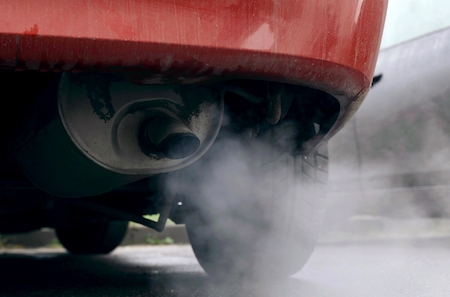Cars are a wonderful invention. They take you anywhere you want to go … until something goes wrong.
Pay attention, and you might be able to stop issues in their tracks. It’s the best way to keep minor issues from turning into full-blown emergencies.
Few things can cause your heart to race as much as engine smoke. What is it? What does it mean?
Before you pull over and have your car towed, there are a few things to keep in mind. Let’s demystify this phenomenon and help you understand what it means for your trusty ride.
Common Reasons a Car Engine May Be Smoking
You’re cruising down the road, enjoying the wind in your hair, and suddenly, you notice smoke billowing out from under your hood. Yikes! Before you panic and start imagining the worst, let’s take a look at some of the common culprits behind that smoky spectacle.
Leaking Head Gaskets
Think of head gaskets as the peacekeepers between your engine’s combustion chambers and coolant passages. When they spring a leak, things can get messy. The hot engine oil can mix with the coolant, resulting in white or bluish smoke.
Defective Coolant System
Engines work best at a specific temperature range, and your coolant system keeps things cool under the hood. If there’s a leak or a malfunction, your engine might overheat, causing steam and smoke to rise. Keep an eye on your temperature gauge.
Electrical Wires Burning
Modern cars are chock-full of wires that control everything from your lights to your engine. If these wires start to fray or short-circuit, they can emit smoke that’s often accompanied by a distinct burning odor. Safety first – if you see or smell this, pull over and call for help.
Worn Pistons
Pistons are like the heart of your engine – they move up and down to power your car. Over time, they can wear down, causing oil to leak into the combustion chamber. The result? You guessed it – smoke!
Faulty Fuel Valves
Your engine relies on a precise mixture of fuel and air to run smoothly. If your fuel valves are on the fritz, you might notice black smoke escaping from your tailpipe, signaling an overly rich fuel mixture.
What’s Causing the Smoke?
Now that we’ve covered the suspects, let’s dig deeper into what’s actually causing that smoke show.
Where is the Smoke Coming From?
The smoke isn’t just a magic trick – it’s coming from somewhere. Turn off your car and take a look around. Is it rising from the engine itself, the exhaust pipe, or maybe even the sides of the hood? This clue can help narrow down the source of the issue.
Be careful when opening up the hood. Smoke can indicate a problem. Lifting the hood can be dangerous if combined with steam or fire. Proceed with caution.
What Color is the Smoke?
Believe it or not, the color of the smoke can provide some valuable insight into the problem. Let’s break it down:
What Black Smoke Indicates
If your exhaust pipe is puffing out thick, black smoke, your engine might be running too rich – meaning it’s burning more fuel than it should. This could be due to a faulty fuel injector, a clogged air filter, or even a problem with your engine’s sensors. It’s not just bad for the environment – it’s bad for your fuel economy, too!
What White Smoke Indicates
White smoke usually means one thing: coolant is getting into the combustion chamber. This might be due to a leaky head gasket or a cracked engine block. Don’t ignore this – excessive white smoke can lead to serious engine damage if left untreated.
What Gray Smoke Indicates
Gray smoke appearing as a thick cloud from your exhaust pipe is usually a sign that your car is burning oil. As oil escapes, it burns off as gray smoke from various parts of the engine. This liquid leaks into the combustion chamber, which can damage your catalytic converter and reduce fuel economy.
What Blue Smoke Indicates
Blue smoke almost always indicates that your car’s engine is burning oil. As the liquid leaks into the combustion chamber, it burns alongside the fuel and creates a unique blue smoke. In addition, you might notice your car misfiring when you turn the key. Your car will shake and shimmy more than usual as it idles. Fixing it early will prevent further damage to your vehicle.
When Does the Smoke Appear?
Is the smoke a constant companion on your drive, or does it only make an appearance during specific circumstances? Does it show up when you’re starting your engine, accelerating, or idling at a stoplight? These timing details can give your mechanic important clues to diagnose the issue.
Is Your Car Overheating?
Your car isn’t just a transportation machine – it’s a finely tuned orchestra of parts working in harmony. When one part goes rogue, like your coolant system failing to keep your engine’s temperature in check, your car might overheat. If your temperature gauge starts creeping into the red zone, pull over, turn off the engine, and let it cool down before continuing.
Now that you know why your car’s engine is smoking …
Remember, the key to keeping your car running well is observation and action. If you notice any unusual smoke, noises, or smells, don’t ignore it and hope it’ll magically disappear. Take a deep breath, pull over if needed, and call your trusted mechanic. It’s always better to address these issues sooner rather than later.
Want a trusted mechanic to partner with you and keep your car in its best condition? We pride ourselves on being a family-owned company. Whether you have a simple question or a complex vehicle problem, we’re always here to provide you with sound advice and friendly service.
Let’s work together to keep your drive smoke-free!

